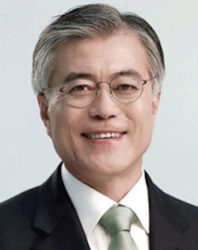SEOUL, (Reuters) – South Korea’s liberal leader Moon Jae-in will take the oath of office as president today, tasked with navigating the country out of rising tensions over North Korea’s nuclear programme and the risk of a rift with the United States.
Moon plans to announce major cabinet and presidential staff appointments almost immediately to bring a swift end a power vacuum left by the removal of his predecessor, Park Geun-hye, in a corruption scandal in March.

The National Election Commission confirmed Moon’s win last night (2300 GMT Tuesday), officially starting his presidency.
Moon will hold his first media briefing as president at 2:30 p.m. (0530 GMT) today after a simple inauguration ceremony.
He will also name officials to the key positions of prime minister, head of the National Intelligence Service, chief of staff, and chief bodyguard, a parliament official said.
Yonhap News Agency reported Moon had already decided on provincial governor Lee Nak-yon as prime minister, although a spokesman for Moon said he was unaware of the report and declined to comment further.
In his first public act as president, Moon, 64, spoke by telephone with Chairman of the Joint Chiefs of Staff Lee Sun-jin, a JSC spokesman said.
A separate statement from Moon’s Democratic Party said he was briefed on the status of the North Korean military and South Korea’s military readiness.
As president, Moon must find a way to coax an increasingly belligerent North Korea to ease its nuclear and missile threats while working with the United States, South Korea’s main ally.
Washington wants to increase pressure on Pyongyang through further isolation and sanctions, in contrast to Moon’s advocacy for greater engagement with the isolated North.
Moon’s administration also needs to figure out how to ease tensions with China stemming from the deployment of a U.S. anti-missile defence system in South Korea to guard against the threat of a North Korean missile strike.
Chinese President Xi Jinping congratulated Moon on his victory, Chinese state media reported.
Other challenges Moon faces include mending a society badly bruised by the corruption scandal that rocked South Korea’s business and political elite.
“I will make a just, united country,” Moon told a crowd gathered just before midnight to see the former human rights lawyer who entered politics to lead a party just five years ago.
“I will be a president who also serves all the people who did not support me,” he said.
In his first public appearance as president, Moon visited the National Cemetery in Seoul on Wednesday to pay his respects to South Korean heroes.
Moon faces a divided parliament in which his Democratic Party lacks a majority. To push through major initiatives, including creating 500,000 jobs annually and reforming the country’s powerful family-run conglomerates, he will need to forge partnerships with some of the parties and politicians he fought fiercely on his path to the presidency.
Moon won with 41.1 percent of the votes but that seemingly comfortable margin belied a deep ideological and generational divide in the country of 51 million people.
Data from an exit poll conducted by South Korea’s top three television networks showed that, while Moon won the majority of votes cast by those under the age of 50, rival Hong found strong support from more conservative voters in their 60s and 70s.
The election has been watched closely by allies and neighbours, with North Korea believed to be gearing up for its sixth nuclear test and vowing to test an intercontinental ballistic missile.
Moon’s election could add volatility to relations with Washington, given his questioning of the deployment of the U.S. military’s Terminal High Altitude Area Defences (THAAD) anti-missile system, but is not expected to significantly change the alliance, a U.S. official said.
“It remains a concern that the left of centre, left-wing party in South Korea is going to do well,” the official told Reuters, asking not to be identified. “But they are going to have to do some coalition building, so I am not sure he’s going be able to have an unadulterated anti-alliance, anti-trade stance.”
The White House congratulated Moon, saying it looked forward to working with him to strengthen the longstanding U.S.-South Korea alliance.
Analysts say Moon will need to act quickly in naming key security and foreign policy aides and ministers in order to ease geopolitical tensions.
Daniel Russel, Washington’s former top diplomat for Asia, told Reuters the differences between Moon and U.S. President Donald Trump would mean inevitable friction, but “don’t portend a crisis or failure” for relations.
“The important thing is the degree to which he will consult, communicate and collaborate with the United States. Will he be a good alliance partner?” said Russel, diplomat in residence at the Asia Society Policy Institute.
Moon pledged during the campaign to turn the presidential Blue House palace into a “rest space for the people” and work in a 19-storey government complex building in Gwanghwamun, in central Seoul.
However, a Moon spokesman told Yonhap on Wednesday he would work in the Blue House for the time being while advisers discussed logistics.




